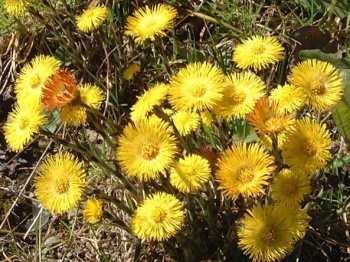Coltsfoot
From Wikiwel
Other Names : Ass's Foot, Brandlattich, British Tobacco, Bullsfoot, Coughwort, Farfarae Folium Leaf, Fieldhove, Filuis Ante Patrem, Flower Velure, Foal's Foot, Foalswort, Guflatich, Hallfoot, Horsefoot, Horsehoof, Kuandong Hua, Kwandong Hwa, Pas Diane, Pas d'Ane, Pferdefut, Tussilage, Tussilago Farfara, Uña de Caballo
See also : Kuan Dong Hua
Special Precautions of Coltsfoot
- Coltsfoot is considered UNSAFE. It contains chemicals called hepatotoxic pyrrolizidine alkaloids (PAs) that can damage the liver or cause cancer. Dietary supplement products sold in the US are not required to state the amount of PAs they may contain. So, if the package doesn’t say the product is certified hepatotoxic PA- free, you can assume that there are probably hepatotoxic PAs in it. Avoid using coltsfoot products that are not certified and labeled as hepatotoxic PA-free.
- Coltsfoot is considered UNSAFE for anyone, but people with the following conditions should be especially careful about avoiding this plant:
- Pregnancy and breast-feeding: Coltsfoot preparations containing hepatotoxic PAs might cause birth defects and liver damage. It’s not known whether coltsfoot preparations that are free of these chemicals are safe to use during pregnancy. So, it’s best to avoid using coltsfoot altogether if you are pregnant.
- If you are breast-feeding, don’t take coltsfoot either. Hepatotoxic PAs can get into breast milk. Even if the product is certified hepatotoxic PA-free, it’s best to avoid use. Not enough is known about the safety of using hepatotoxic PA-free coltsfoot during breast-feeding.
- Allergy to ragweed and related plants: Coltsfoot may cause an allergic reaction in people who are allergic to the Asteraceae/Compositae plant family. Members of this family include ragweed, chrysanthemums, marigolds, daisies, and many others. If you have allergies, be sure to check with your healthcare provider before taking coltsfoot.
- High blood pressure, heart disease: There is a concern that coltsfoot taken in large amounts might interfere with treatment for these conditions. Don’t use coltsfoot if you have these conditions.
- Liver disease: There is a concern that hepatotoxic PAs might make liver disease worse. Don’t use coltsfoot if you have this condition.
- Medications for high blood pressure (Antihypertensive drugs) interacts with coltsfoot.
- Medications that increase break down of other medications by the liver (Cytochrome P450 3A4 (CYP3A4) inducers) interacts with coltsfoot.
- Medications that slow blood clotting (Anticoagulant / Antiplatelet drugs) interacts with coltsfoot.
The benefits of Coltsfoot are
Coltsfoot has been traditionally used by Native Americans for thousands of years to strengthen the lungs. It clears out excess mucus from the lungs and bronchial tubes. It soothes the mucus membranes in the lungs, and has been shown in research to assist with asthma, coughs, bronchitis, and other lung ailments. Demulcent properties.
- Asthma.
- Sore throat.
- Cough.
- Bronchitis.
- Hoarseness.
- Wheezing.
- Laryngitis.
